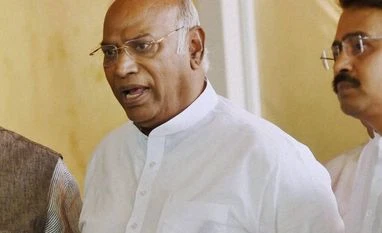New labour laws 'weakened' trade unions, removed 'security net': Congress
Parliament approved the 3 labour codes that will remove impediments to winding up of companies and allow firing of staff without government permission in firms with up to 300 workers
)
Mallikarjun Kharge
Describing the three labour codes passed by Parliament as "anti-labour", the Congress on Saturday attacked the government, alleging the legislations have "weakened" trade unions and removed the "security net" for workers.
Parliament on Wednesday approved the three labour codes that will remove impediments to winding up of companies and allow firing of staff without government permission in firms with up to 300 workers from the existing 100.
Attacking the government over the bills, senior Congress leader and former minister of labour and employment Mallikarjun Kharge said the government's claim that the laws will increase ease of doing business is false.
"They have weakened trade unions and finished the security and safety for the workers," he told an online media briefing.
"States' powers have been usurped by the central government with these laws. These codes are anti-worker, anti-labourer and it is important to agitate against them," the Rajya Sabha MP said.
Also Read
"All parties must oppose these laws. The Modi government only listens to corporates and after these laws it will not listen to trade unions," he said.
Congress spokesperson Pawan Khera alleged this government is "betraying the interests" of different sections one after another.
As the issue of injustice to farmers was ongoing, this government betrayed workers, just like farmers," he said.
"The government made the excuse while bringing in the new labour laws there will be ease of doing business and it will be beneficial for all. But if you look at the laws it is clear that there is no protection and relief for workers in these laws," Khera said.
Despite the country witnessing the hardships of migrant labourers during the lockdown, there is no provision for them in these laws, he claimed.
"It is in the DNA of the government to set aside democratic principles and force its decisions on the people," Khera alleged and claimed the laws were passed by Parliament in a rush.
Indian National Trade Union Congress president G Sanjeeva Reddy alleged that there is no provision for safety and security of workers in these bills.
"We will protest and struggle against these unjust, anti-labour and anti-trade union laws," he said.
These laws have been brought for strengthening and helping the capitalists and corporates not the workers, he alleged, claiming that under the new provisions, the workers will not be able to go on strike or raise their voice against unjust practices.
There was protection for workers earlier as permission was needed to lay off more than 100 workers, but now that "security net" is gone with the increase in threshold to 300, he said.
"About 2-3 crore small scale industries have been excluded from this protection," he claimed.
On Wednesday, Rajya Sabha had passed by voice vote, the three labour codes on industrial relations, social security and occupational safety amid a boycott by opposition parties, including the Congress and the Left, over the suspension of eight MPs.
The first code on wages was approved by Parliament last year. With passage of these three codes, 29 central labour laws have been codified into four broad codes as contemplated by the government under labour reforms to improve ease of doing business and providing universal social security to workers as well.
The three codes were passed by Lok Sabha on Tuesday.
"The purpose of labour reforms is to provide a transparent system to suit the changed business environment," Labour Minister Santosh Gangwar had said in the Rajya Sabha while replying to the debate on the three labour reforms bills.
The minister had also told the House that as many as 16 states have already increased the threshold for closure, lay off and retrenchment in firms with up to 300 workers without government permission.
The Opposition has also been protesting the passage of three agriculture-related bills -- Farmer's Produce Trade and Commerce (Promotion and Facilitation) Bill, 2020, the Farmers (Empowerment and Protection) Agreement of Price Assurance and Farm Services Bill, 2020 and the Essential Commodities (Amendment) Bill, 2020.
They have been passed by both Houses and await presidential assent.
(Only the headline and picture of this report may have been reworked by the Business Standard staff; the rest of the content is auto-generated from a syndicated feed.)
More From This Section
Don't miss the most important news and views of the day. Get them on our Telegram channel
First Published: Sep 26 2020 | 3:27 PM IST
